Andrew Carroll collects little nuggets of history.
He is best known as editor of the book “War Letters: Extraordinary Correspondence from American Wars,” a collection of letters from soldiers to their loved ones back home. It became a best-seller, earning Carroll the opportunity to keep digging. He’s written and edited several books, including “Letters of a Nation,” “Behind the Lines” and “Operation Homecoming,” which inspired an Oscar-nominated and Emmy-winning film.
Carroll is back with a new collection, “Here is Where: Discovering America’s Great Forgotten History” (Crown Archetype, $19.26). Largely culled during his time traveling the country for “War Letters,” the new book spotlights unmarked locations across the country where momentous things happened — places of marvel, wonder and import.
One is in Portland: Carroll tells the story of Neal Dow and the Rum Riot of 1855 in Monument Square.
Dow, who was elected Portland’s mayor in 1851, drafted a bill making Maine the first state in America to ban the sale of alcohol, and helped secure its passage by meeting with the governor. Four years later, more than 1,000 men and women gathered at Monument Square in protest. Dow ordered the crowd to disperse, then instructed the militia to open fire.
One man died. Seven others were shot. Dow was charged with manslaughter, but not convicted. His law was abolished the following year.
Dow’s home, at 714 Congress St., is now a National Historic Landmark and open for visitors, though few people darken the doors. Carroll quotes a caretaker at the house, who estimates annual visitation is “on average about 12.”
“Almost 15 years ago, I began keeping files of these forgotten stories. I had no intention of doing a book. They just fascinated me,” Carroll said by phone from Washington, D.C. “When I traveled to a city or town for work on ‘War Letters,’ I almost made it a game to find a historic site while I was there. It made me walk around the city, ask questions and talk with the local historical society. It was a fun way to learn a city’s history through these lesser-known places.”
Carroll, 43, refers to history as “a pattern of human behavior over time that can caution us and serve as an inspiration.” Being aware of history sharpens our perspective, he said, and helps us see the world in different ways.
Carroll actually grew up with little interest in history, and still finds Colonial-era house museums stuffy and mundane. But between his senior year of high school and his first year of college, his family house in D.C. burned down. Everything was lost.
“It was losing all that family memorabilia that really got me interested in preserving the past,” he said.
Q: What interested you in the Neal Dow story?
A: I think, first, I’m always interested in the people who were pioneers in one way, or at the forefront of a movement or influenced it. Dow was both of those things. He was such a pivotal figure, and has sort of been overlooked. He died before Prohibition, but he created the groundswell for Prohibition years before.
Q: How do you think he would be perceived in today’s world?
A: Not well, probably. We’ve gone through the Prohibition thing, and it didn’t work. People didn’t like being told they couldn’t drink. But he was a fascinating character. He was a Civil War hero. He was 56 when he volunteered to serve in that war. That aspect of his life is so heroic. And on the positive side, he was an early abolitionist as well. He had some really positive characteristics. But his push to not allow people to drink would not be popular, I think it’s safe to say.
Q: For about a year, I lived one block away from the Dow house. I walked by it several times every day, but never stopped in. I’m obviously not alone.
A: The house doesn’t really receive a lot of visitors throughout the year. I was fortunate, the day I was there some people did show up, so I got to hear the tour. But there are no markings of the rum riot in the square, and no real interpretation of the events that took place there. That’s why this book was so much fun to do.
Q: Tell me about your experience in Portland. What did you like about the city?
A: I grew up outside of Boston, so I love New England, and Portland is a quintessential New England town. There is a real sense of community. When I was there, I had local historian Herb Adams give me a tour, and walking down the streets with Herb, with everybody calling out his name, I felt a real sense of community. These are cities and towns that were built before the automobile. You can walk through them. There is this physical closeness.
Q: You are coming back to read, correct? When, where?
A: Yes, I am doing something at noon July 9 at the (Portland) library. It’s more a talk than a reading. I talk about the behind-the-scenes stuff, what it was like to collect these stories and why I find them fascinating. But what I love about these events, people often share ideas with me or things I haven’t heard about. It’s through email and Twitter that I am getting information about unmarked cities across America.
Q: What did you enjoy most about researching this book?
A: It’s such an exhilarating way of exploring and experiencing this country. I try to tell the sweep of American history through these sites. In this age where we feel everything is mapped out and tagged, there is still so much out there to discover. That sense of exploration is something I hope readers take away from this.
Staff Writer Bob Keyes can be contacted at 791-6457 or:
bkeyes@pressherald.com
Twitter: pphbkeyes
Send questions/comments to the editors.





Success. Please wait for the page to reload. If the page does not reload within 5 seconds, please refresh the page.
Enter your email and password to access comments.
Hi, to comment on stories you must . This profile is in addition to your subscription and website login.
Already have a commenting profile? .
Invalid username/password.
Please check your email to confirm and complete your registration.
Only subscribers are eligible to post comments. Please subscribe or login first for digital access. Here’s why.
Use the form below to reset your password. When you've submitted your account email, we will send an email with a reset code.